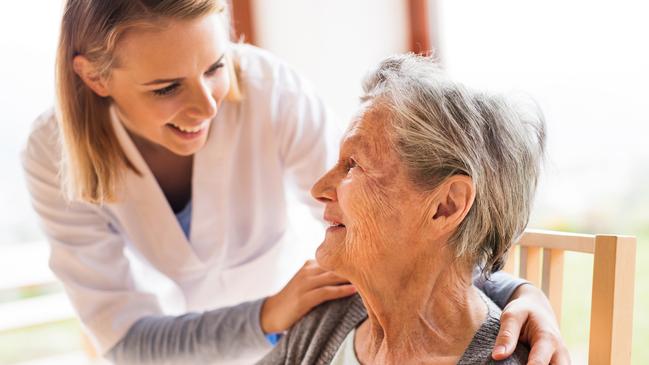Jane Mussared: My headline hopes for 2019 – combating ageism and addressing isolation and loneliness among older people
One of the things I love most about South Australia is our sense of fair play – but ageism manifests itself in many ways and continues to shackle the lives of older people, writes Jane Mussared.
Opinion
Don't miss out on the headlines from Opinion. Followed categories will be added to My News.
One of the things I love most about South Australia is our sense of fair play and community.
It gives me real hope that we can and will lead the world in embracing our longevity and writing the new rule book for modern ageing.
But to get there, we will need to do more to promote opportunities for older people to live life to the full, whether they are in robust health, frail or somewhere in between.
Two immediate challenges are my headline hopes for 2019 – combating ageism and addressing isolation and loneliness among older people.
Ageism manifests itself in many ways and continues to shackle the lives of older South Australians.
Ageism has been a causal factor in abuse and neglect.
It has given permission to some carers and institutions to offer substandard (and worse) care in exchange for the trust placed in them by vulnerable older people.
Ageist attitudes – whether thinking that no one will notice or believing that the later stages of life are of diminished value – has led some to discount the quality of their care.
Inadequate care also happens in some families – albeit mostly out of sight – committed by the people who are trusted most.
Ageism also results in older people failing to get and keep jobs.
We still impose a narrow lens on what the ideal employee looks like and anyone outside that lens must work impossibly hard to let their merit shine.

Where age is concerned, judgment of “merit” is anything but objective.
For those choosing entrepreneurship rather than employment, the start-up world is apparently dogged by ageism.
According to founders of more than 500 start-up companies, age discrimination is widespread in their world, and even more prevalent than discrimination based on either gender or race.
Ageism impacts health care.
There is a dangerous tendency for some to use an “age” test when evaluating interventions rather than applying a judgement based on evidence and efficacy, and we do not yet recognise the value of health promotion throughout life.
Groundbreaking work led by Adelaide researchers is showing that frailty is often reversible or manageable including through adjusting physical environments, nutrition, exercise, socialisation and other health promoting investments. My second hope is that we will be alert to the increasing risks of isolation and loneliness among older people.
More of us live alone than ever before and the chance of living alone increases steadily with age.
By the time we are over 80, 23 per cent of men and 40 per cent of women live alone.
While living alone does not necessarily lead to loneliness, the risk does increase.
Living alone often also contributes to poverty and housing stress such that more and more older women especially are staring down the risk of homelessness.
The impact of cost of living on socialisation was apparent in a recent national COTA survey of older Australians that found that one in five older people don’t have enough money to spend on the activities that would enable their social connectedness.
While there is a growing awareness of the risk of loneliness among older people, many of the proposed solutions do not address the fundamentals of the way our society organises itself so older people can take part more easily – accessible transport, better physical environments, and new opportunities for roles, purpose and friendships.
We have not kept up with the changes in our demographics and circumstances and adjusted our environs and communities accordingly.
The answer is often a new service that carries a real risk of turning a universal social need into a charitable objective.
Digital exclusion compounds a sense of isolation for many older people who, despite their best efforts to learn the new language of IT, remain disconnected.
There is a rising impatience with those not transacting online among government and business, who are abandoning non-digital communications and even imposing financial penalties on people unable to engage digitally.
We continue to tolerate very poor transport options for many people who, in accepting their responsibility to forgo a driver’s licence, struggle to find alternatives that work for them.
We are not good at spacing bus stops. We are not good at recognising that patronage numbers should not be the only “driver” for supporting public transport routes.
We are unimaginative in addressing the rural transport barriers that stop older people from interacting within their local communities seven days a week.
South Australia is famous for our lifestyle advantages and we will attract businesses to make their headquarters here for that reason.
We now need to find ways for all people to be engaged, valued and central to the life of the SA community.
As we focus on bringing younger South Australians home as part of our future-proofing, it is just as important to build value into the lives of older South Australians.
Jane Mussared is chief executive of Council on the Ageing SA


